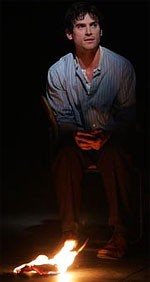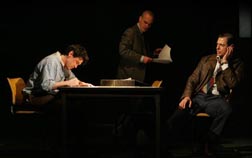
Lucy Komisar
"The Pillowman" is a bizarre
gothic horror story.
Riveting but far-fetched tale an unlikely literary metaphor.
By Lucy Komisar
"The Pillowman."
Written by Martin McDonagh. Directed by John Crowley.
Booth Theatre, 222 W. 45th Street.
212-239-6200.
Opened April 10, 2005.
Reviewed by Lucy Komisar April 14, 2005.
Buy
Pillowman Tickets
 |
| "The Pillowman" by Martin McDonagh. Billy Crudup. Photo by Joan Marcus. |
This gothic horror morality tale by Irish playwright Martin McDonagh is both more and less than it pretends to be. The "more" depends on the symbolism you attribute to it. The "less" is that the symbolism is rather far-fetched. It makes the play fascinating, even riveting, but on another level strangely unsatisfying.
Katurian (Billy Crudup), a writer in a totalitarian state, is interrogated about child murders similar to his bizarre stories of awful violence. The police (Jeff Goldblum and Zeljko Ivanek), who think of themselves as good men, threaten to beat him up, execute him. In fact, they want to execute a writer. Goldblum is businesslike, direct, like an efficient, murderous CEO.
The interrogation room of soft gray walls, brick floor, and hanging lamps and the cell enclosed by pealing brownish paint (designed by Scott Pask) evoke every dungeon there's ever been.
The police have also detained Katurian's brother Michal (Michael Stuhlbarg), who is mentally retarded, and Katurian is distraught about the ill treatment he is suffering. Stuhlbarg plays Michal as eerily soft voiced, not bright, but surprisingly sharp. What does this childlike man have to do with the plot?
The viewer, confronted with searing brutality, tries to find some meaning. Why is this man writing such terrible things? Do we blame a problem childhood? His weird parents made him dream horrors and committed dreadful acts so that they could inspire
 |
| "The Pillowman" by Martin McDonagh.Madeleine Martin. Photo by Joan Marcus. |
him to write great stories: crimes committed in the name of art.
Maybe, in revenge, or because people write about what they know, his stories show how awful life is so that people will kill themselves to avoid the pain. His literary device: the Pillowman gets kids to kill themselves so they won't grow up and experience horrors. In a trick literary device, the Pillowman can foresee and change stories' endings.
Director John Crowley presents the interrogation and the stories in vivid gothic fashion, a kind of magical realism. And the actors give sharply-etched performances
There's still the mystery of who is committing terrible crimes that copycat the gruesome stories. Supposedly, this is a commentary about the impact of art. On the other hand, this is less original than claimed: disturbed people committed copycat crimes based on tacky movies all the time.
Or maybe it's about people using childhood to justify their behavior. In this case, the police and their victims are all criminals.
On the other hand, maybe this is just a writer with a bizarre bent. Katurian tries to make a deal with the interrogators to save his manuscripts. He explains, "It isn't about being dead, it's what you leave behind." Maybe all he really needed was a good agent.
 |
| "The Pillowman" by Martin McDonough. (l-r)Billy Crudup, Zeljko Ivanek, Jeff Goldblum. Photo by Joan Marcus. |
McDonough can't resist a final mordant joke. The tough interrogator
Tupolski (Goldblum) orders Katurian, "When the hood goes on, you've
got about ten seconds. So keep the Latin chants to a minimum." [Komisar]